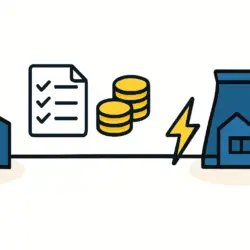Malta has announced an offshore energy and hydrogen strategy to launch by 2025, focusing on developing offshore renewable energy and green hydrogen production. This initiative is designed to enhance the country’s energy sustainability and reduce its reliance on imported fossil fuels.
New Authority to Oversee Offshore Energy Projects
The government plans to establish a new authority to oversee the development of offshore renewable energy projects. This body will manage the leasing of offshore areas for energy production, ensuring that projects are implemented efficiently and align with national goals. Legislation to create the authority is expected to be finalized by the end of 2025, with the first leasing process for offshore areas anticipated to begin in 2026.
Energy Minister Miriam Dalli emphasized the strategy’s importance for harnessing Malta’s offshore resources. “The strategy will guide us in using our offshore resources to generate renewable energy, which is crucial for our energy security and sustainability,” said Dalli.
Green Hydrogen Production and Storage
Beyond offshore energy, the strategy includes developing green hydrogen production and storage facilities. Malta plans to produce green hydrogen by using renewable energy to electrolyze water, a process that creates a clean energy source. This hydrogen will then be stored and used to power the country’s energy systems, helping reduce its dependence on imported natural gas.
The Malta Energy Authority will play a key role in implementing this strategy, developing the necessary infrastructure for hydrogen production and storage. The authority will also oversee pilot projects to test hydrogen’s feasibility as a major energy source for the country.
Integration with the European Energy Grid
Integrating Malta’s energy system with the European grid is another key component of the strategy. The country plans to construct an additional interconnector that will allow for the export of surplus renewable energy. This connection will not only provide Malta with a more stable and diversified energy supply but also create opportunities to export clean energy to other European nations.
Prime Minister Robert Abela highlighted the significance of this integration, stating, “By connecting Malta to the European energy grid, we are ensuring that our renewable energy efforts contribute to the broader European energy market. This will strengthen our position as a key player in the renewable energy sector.”
Malta Targets 50% Renewable Energy by 2030
The government has set an ambitious target for renewable sources to account for 50% of the country’s energy consumption by 2030. To meet this goal, Malta plans to invest further in renewable energy projects, including solar and wind power, and develop new energy storage solutions.
Interestingly, Singapore has already reached its solar target ahead of schedule, supplying 4% of peak demand with solar power. This success story highlights the potential for accelerating green energy initiatives in smaller nations.
This comprehensive strategy, combining offshore energy, green hydrogen, and European grid integration, is critical for achieving these targets. The government is confident these initiatives will help Malta reach its renewable energy goals while positioning the country as a leader in the transition to a sustainable energy future.
The launch of this strategy marks a significant milestone in Malta’s journey toward energy sustainability. By establishing a new authority, developing green hydrogen, and integrating with the European energy grid, Malta is poised to become a key player in the renewable energy sector. This plan not only aligns with the country’s long-term energy goals but also contributes to the global effort to combat climate change.



